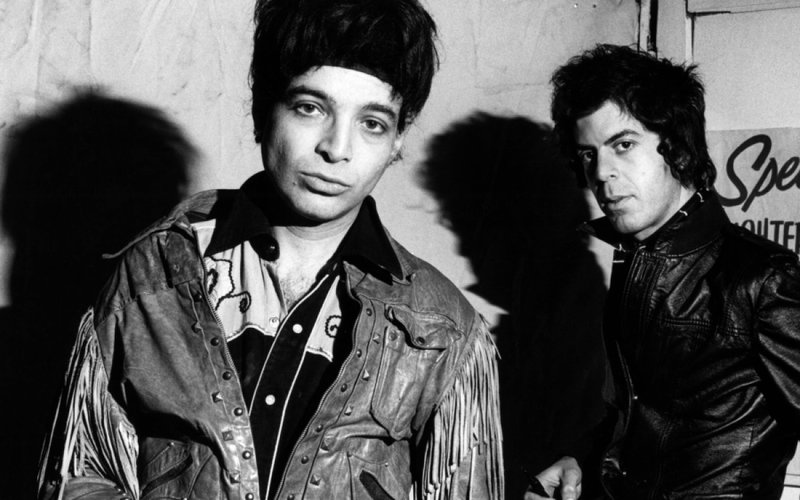
🚨WARNING: For Halloween, KEXP is exploring the horrifying true stories behind some of the creepiest songs we play. Please note, this post contains highly disturbing and graphic content. Please continue at your own risk. 🚨
You can't have a list of scary songs without mentioning "Frankie Teardrop", the terrifying 1977 single from New York synth-punk pioneers Suicide. At the time of its release, the album was mostly ignored due to being released on the upstart indie label Red Star Records, and the few reviews it did receive were not the most glowing. Rolling Stone magazine called it "absolutely puerile" and declared Alan Vega's vocals as "nothing but arrogance and wholesale insensibility." Decades later, they included the album on their "500 Greatest Albums Of All Time" list. ("Do I feel vindicated about that today?" asked Marty Thau, founder of Red Star Records to Uncut Magazine. "Yes, I do.")
Frankie teardrop
Twenty year old Frankie
He's married, he's got a kid,
And he's working in a factory
The centerpiece of the band's self-titled debut LP is the 10-minute-long saga "Frankie Teardrop." Like many of the scariest songs ever written, it's based on a true story. While the exact case has been lost to the ages, it's sadly not an uncommon story: a young father, working ten hours a day at a factory, still can't seem to make enough money to take care of his wife and child. Facing eviction, he snaps, killing his family and himself. In an interview with Electronic Music, Vega reflects:
“I changed the lyrics. Before, it was about a detective at the race track, because I went to the race track a lot in those days, but then I saw this story in the paper about this factory worker who died, so it became a whole new thing, and a lot more relevant.”
Instrumentalist Martin Rev crafted an unrelenting drone using a broken Farfisa organ against an anxiety-inducing electronic drumbeat, created using a Seeburg Select-A-Rhythm Model 601B set to the Shuffle preset and sped up. In two improvised takes, Vega embodied the spirit of this desperate factory worker, releasing something primal from within him. He continued to Electronic Music:
“Lots of ’em, just trying to survive. That’s what ‘Frankie’ is about. It’s a self-portrait, of everybody. ‘We’re all Frankies, all lying in hell’. I really got into it, because the music had so much of an effect. I almost blacked out with those screams I did. Marty [Thau] put on some static from the radio, which really made it. That bloodcurdling scream still gets me when I listen to it. I hadn’t listened to it for a long time and when I did it really scared the crap out of me. That’s one of my longest screams there. Putting myself in the guy’s mind was genuinely disturbing. I always think it’s the song Lou Reed wishes he would have done.”
Oh let's hear it for Frankie
Oh Frankie Frankie
In fact, Lou Reed did later say he wished that he had written the song. And none other than Bruce Springsteen raved about it in a 1984 Rolling Stone interview, exclaiming, "Oh, my God! That’s one of the most amazing records I think I ever heard. I love that record." The influence could later be heard on his critically-acclaimed album Nebraska, a first-person concept album inspired by the true story of 19-year-old spree killer Charles Starkweather and his 14-year-old girlfriend, Caril Ann Fugate. (Again with real life being scarier than fiction.) The track "State Trooper" in particular sounded so much like Suicide that Alan Vega thought it was one of their own songs the first time he heard it.
"Frankie Teardrop" also inspired fellow listener-powered radio station WFMU to devise a challenge on their popular weekly call-in show The Best Show with Tom Scharpling. Listeners were asked to walk outside somewhere dark and quiet at around 3 AM and listen to the entirety of "Frankie Teardrop" on headphones, as loud as you could, by yourself. Reportedly, not many were able to complete the challenge.
We're all Frankies
We're all lying in hell
It's been over forty years and "Frankie Teardrop" has lost none of its power and its legacy as one of the scariest songs ever created lives on. For some, it's an important document of the fragility of humankind. In Uncut Magazine's extensive oral history on the making of the song, Thau states:
'Frankie' was really a political statement: 20-year-old Frankie can’t get a job, can’t support his wife and kids, freaks out, kills them. Society has driven him to it. In the end, the statement is, 'Rise up, we’re all Frankies.' We’re all under the thumb of those who control us. Rise up and say something about it.
On the other hand, there's those like author Nick Hornby who declare it a song you only really need to hear once. In his 2002 essay collection Songbook (also released under the title 31 Songs), he acknowledges that the track is "in all sorts of ways, an extraordinary piece of work," but he adds, "I have no use for it now." In a passage, he adds:
Me, I need no convincing that life is scary. I’m forty-four and it has got quite scary enough already — I don't need anyone trying to jolt me out of my complacency. Friends have started to die of incurable diseases, leaving loved ones, in some cases young children, behind. My son has been diagnosed with a severe disability, and I don’t know what the future holds for him... So, let me find complacency and safety where I can, and please forgive me if I don't want to hear 'Frankie Teardrop' right now.
Appearing on their 1983 EP Metal Circus, "Diane" tells the harrowing true story of 19-year-old Diane Edwards.
KEXP shares the story behind Neko Case's haunting 2002 track "Deep Red Bells."
KEXP reveals the tragic true story behind one of the first songs Morrissey and Marr ever wrote together.